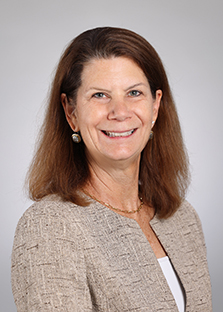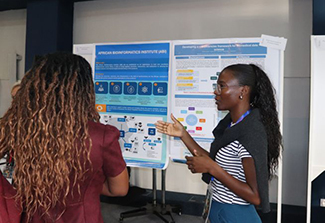Strengthening capacity in data science: Preparing for the next quarter century and beyond
January/February 2025 | Volume 24 Number 1
 Fogarty Director Kathleen Neuzil, MD, MPHRead recent commentary on global health research issues from current and immediate past directors of the Fogarty International Center.
Fogarty Director Kathleen Neuzil, MD, MPHRead recent commentary on global health research issues from current and immediate past directors of the Fogarty International Center.
As I write this first column of 2025, it’s hard to believe a quarter century has passed since the anxiety about Y2K. As many people remember, the Y2K fear was that computer systems and software would fail when the date rolled over from December 31, 1999, to January 1, 2000. Concerns stemmed from how dates were commonly programmed with a two-digit year format in older computer systems. Fortunately, proactive audits, testing, upgrades and contingency planning allowed the world to move past midnight of New Year’s 2000 with minimal computer-related disruptions.
Our dependence on technology has only escalated in the past 25 years, as has computing performance and the access by organizations and individuals to large computing systems. The use of big data computing and data analysis to inform decisions is now commonplace for the infrastructure, financial, health and business sectors – and, increasingly, for scientific discovery and advancements. Innovations in data collection, technology, and mass production of data worldwide have fueled the popularity of “data science.”
The National Institutes of Health (NIH) defines data science as “the interdisciplinary field of inquiry in which quantitative and analytical approaches, processes, and systems are developed and used to extract knowledge and insights from increasingly large and/or complex sets of data.” NIH makes a wealth of biomedical data available to research communities and aims to make these data findable, accessible, interoperable, and reusable—or FAIR. NIH also seeks to make these data usable with artificial intelligence and machine learning applications.
In November 2024, I had the opportunity to witness an innovative, multidisciplinary and collaborative NIH data science program in action when I attended the
Data Science for Health Discovery and Innovation in Africa (DS-I Africa) consortium meeting. DS-I Africa is an NIH Common Fund initiative that leverages prior investments by NIH and other funders in this discipline. Fogarty is one of four lead Institutes and Centers (ICs) – along with the National Institute of Biomedical Imaging and Bioengineering, National Institute of Mental Health and National Library of Medicine - that coordinate the day-to-day management of the program. In addition, DS-I Africa harnesses the collective wisdom and experience of 16 institutes, centers, offices and entities at NIH, which fund, manage, and/or provide project scientists for individual awards.
DS-I Africa awards were first launched in September 2021, when NIH funded 38 awards across 22 African countries and 28 U.S. universities. The achievements in the short tenure of this program have been remarkable. In only three years, DS-I Africa has made a unique and important contribution to NIH’s portfolio and to the research landscape in Africa. At the meeting I attended, I learned how researchers are applying artificial intelligence/machine learning-based technology to overcome specialized training and technology barriers for the diagnosis and prognostication of colorectal cancer; to combat antimicrobial resistance; to understand the relationship between air pollution exposure and maternal and child health; and to develop mobile applications to track patients discharged following trauma care.
 Photo courtesy of eLwazi Open Data Science
A poster presentation at DS-I Africa Consortium meeting by eLwazi Open Data Science Platform member.
Photo courtesy of eLwazi Open Data Science
A poster presentation at DS-I Africa Consortium meeting by eLwazi Open Data Science Platform member.
The initiative has grown into a powerful multidisciplinary and multisectoral network with over 300 partner organizations and has produced more than 150 scientific publications. DS-I Africa researchers are applying data science approaches to develop innovations to address critical health problems with relevance to the African continent, and also with implications for the U.S. population. I was impressed with the innovative, enthusiastic and dedicated investigators whom I met, including many early career investigators who were a focus of this program from its inception. The vibrant atmosphere fostered networking and scientific dialogue.
A global, highly integrated data science research landscape is within reach. None of us can predict the future of data science, but we can be certain that it will continue to evolve and advance. It is critical that scientists everywhere have the access and training necessary to effectively use data to advance science, influence policy and improve health for all. DS-I Africa is a great example of a program built – like so many others at Fogarty – on the foundation of partnership, sustainability and capacity strengthening. It is fun to imagine what the next 25 years will bring.
More information
Updated February 13, 2025
To view Adobe PDF files,
download current, free accessible plug-ins from Adobe's website.
Related Fogarty Programs
Related World Regions / Countries